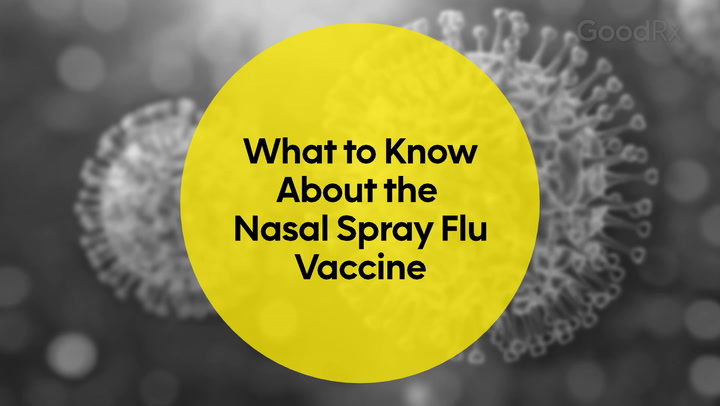GoodRx Guide
Flu Vaccines
Comprehensive information for you or a loved one — including treatment options and discounts on popular medications.The flu is a contagious respiratory illness caused by influenza viruses. Most people with the flu experience symptoms, such as fever, cough, and body aches.
But some people can have complications from the flu, such as pneumonia. And the flu is a particular concern for people who:
Are under age 2 or over age 65
Are pregnant
Have a weakened immune system
Have health conditions, like heart disease, respiratory disease, or diabetes
One of the best ways to prevent the flu is by getting an annual flu vaccine. With rare exceptions, everyone ages 6 months and older should get a flu shot every year. should have a flu shot every year.
What is the flu shot?
The flu shot is another term for the flu vaccine. It’s called a "shot" because most flu vaccines are injected under the skin. But one type of flu vaccine can be inhaled through the nose.
Several types of flu vaccines have been made over the years. Recommendations change year to year because the virus also changes from year to year. Each year, experts look at research to determine which strains of influenza will be most prevalent and, therefore, which vaccinations should be used.
For the 2025-2026 flu season, all flu vaccines in the U.S. are trivalent. This means they can protect you against three different types of flu viruses:
Two influenza A viruses (H1N1 and H3N2)
One influenza B virus (Victoria lineage)
Who should get the flu shot?
Everyone ages 6 months and older should get vaccinated for the flu every year, even if they’re healthy.
Here are the only exceptions:
If you’re currently sick with a fever, wait to get a flu shot. This doesn’t mean you can’t get the flu shot at all. But talk to a healthcare professional first. They may recommend that you wait until your current symptoms have passed.
If you have a history of Guillain-Barré syndrome (GBS), talk with a healthcare professional before getting the flu shot.
If you have a severe, life-threatening allergy to one of the vaccine ingredients (not eggs) or to the vaccine itself, talk with a healthcare professional about how to best protect yourself.

When should you get a flu shot?
In the U.S., flu season can start as early as October. The CDC recommends getting the flu shot at least 2 weeks before the flu starts circulating in your community — preferably by the end of October. But you can get vaccinated later in the flu season, too.
It takes about 2 weeks after you get the flu shot for you to be protected against the flu. Everyone needs a new flu vaccine every year, since immunity wears off after about 6 months.
Keep in mind: Some children might need 2 doses given at least 4 weeks apart to be fully protected. This includes children between ages 6 months and 8 years who’ve never had a flu vaccine before.
How does the flu vaccine work?
The flu vaccine helps your body protect itself against the flu. It works by training your immune system to fight the flu virus.
The immune system is like a defense system, with white blood cells as soldiers. Typically, if germs enter the body, white blood cells recognize them as bad guys. This is because germs carry proteins (antigens) that are different from normal body cell proteins. In response, white blood cells start making defense proteins (antibodies). These antibodies help white blood cells destroy the germs.
Making the right antibodies can take a few days. In the meantime, the germs keep making you sick. In most cases, the immune system clears the infection and retires the antibodies — except for a few antibodies that get stored as a memory for future infections.
Vaccines work by harnessing the body’s natural defense system. A vaccine contains a harmless amount of a virus or bacteria. By introducing it into the body, the immune system learns to make and store an antibody memory against it.
How effective is the flu vaccine?
The effectiveness of the flu shot varies from year to year. So far, it’s too early to say for sure how well the 2025-2026 shot will work.
Most years the flu shot is between 40% and 60% effective. For example, in 2024-2025 it was about 42% effective. This means that people who got vaccinated last year were 42% less likely to get sick with the flu, compared with people who didn’t get the vaccine.
Choosing which flu strains to target in vaccines is tricky because the virus changes so quickly. Scientists have to make an educated guess months before flu season, to leave enough time to make the vaccines. Because of this, the vaccine doesn’t always match the exact flu strains going around.
But a vaccine that’s 42% effective is still better than nothing. So you should still get your flu vaccine this fall.
Types of flu vaccines
All flu vaccines include parts of influenza viruses. But this looks different for different types of vaccines:
Live attenuated influenza vaccine (LAIV): These flu vaccines are made with tiny amounts of weakened live virus. Because this flu vaccine is a live vaccine, the LAIV may not be the safest option for some people, such as those with a weak immune system.
Inactivated influenza vaccine (IIV): These vaccines are made with varying amounts of dead virus.
Recombinant influenza vaccine (RIV): These vaccines are made with synthetic (lab-made) virus.
Most flu vaccines are injected. This means they’re given by needle into your arm. But one injectable flu vaccine (Afluria) has an option to be given by jet injector. It uses high pressure to pierce the skin, rather than a needle. The only vaccine that’s not injected is the LAIV, which is given as a nasal spray (FluMist).
What is in the flu shot?
The flu vaccine is made of tiny amounts of flu virus along with other ingredients that are part of the production process. Flu vaccines may also contain additives that help to stabilize the vaccine, or make it more effective. Depending on the vaccine, the ingredients in a flu shot may include:
Adjuvants: These are ingredients that help boost your vaccine response. Adjuvanted vaccines can help people ages 65 and older have a stronger immune response to the flu shot.
Stabilizers: These are sugars and proteins that help to extend the vaccine’s shelf life.
Thimerosal (ethylmercury): This is a naturally occurring element that’s been used safely as a preservative for decades. It’s used to keep germs from growing in multi-dose vaccine vials.
Formaldehyde: This kills viruses when making vaccines. The amount in the flu shot is very small and not dangerous. In fact, your body naturally makes and processes much more formaldehyde on its own than what’s included in vaccines.
Antibiotics: These keep bacteria from growing in the vaccine during production. The amount of antibiotics in vaccines is small or undetectable. Antibiotics that many people are allergic to — like penicillin — aren’t used in vaccines.
Egg protein: This is found in some flu vaccines, but not all. Most people who have egg allergies can still get a flu shot.
Latex: There’s no latex in the vaccine liquid. But latex may be used for the stopper on the vaccine vial or syringe. Latex allergic reactions from a flu shot are rare, but possible.
What are common side effects of the flu vaccine?
Some people may have flu-like symptoms after getting vaccinated. These symptoms are usually mild and can include:
Fatigue
Fever
Body aches
Headaches
These are normal side effects. These symptoms are a sign your body is making antibodies. They usually go away in 1 to 2 days. Having these symptoms doesn’t mean you’re getting the flu. You can’t get the flu from the flu shot.
These flu shot reactions tend to come on soon after the vaccine and don’t last long. They don’t mean that the flu vaccine has made you sick.
Flu vaccines for older adults
Age is an important factor to consider, since different vaccines are approved for different age groups. If you’re age 65 or older, any flu vaccine approved for your age group is fine.
But, if it’s available, the CDC suggests that people ages 65 and older choose one of the following:
Fluzone High-Dose (high-dose IIV): This contains a higher dose of virus antigen. It’s meant to give a better immune response against the flu to people ages 65 and older.
Flublok (RIV): This is a lab-made flu vaccine. There’s some evidence that it may be more effective in older adults than standard inactive influenza vaccines (IIVs).
Fluad (adjuvanted IIV): This is an inactivated influenza vaccine (IIV) with an added ingredient, called an adjuvant. The adjuvant may help your immune system respond to the vaccine. Just like the other two listed above, there’s some evidence that it might be especially helpful for older adults.
It’s important to note that if one of these flu vaccines is unavailable, you should still get vaccinated with another approved vaccine for your age group. All flu vaccines will provide protection regardless of your age.
Where to get a flu vaccine
The most convenient place to get your annual flu vaccine may be your local community pharmacy. Places like CVS, Walgreens, and other local pharmacies typically offer flu shots as soon as they’re available. Contact your local pharmacy or visit their websites for more information on whether you need to make an appointment.
You can also get your flu shot at retail health clinics, such as CVS MinuteClinic. This option provides an extra layer of privacy, as you’ll be vaccinated in a private room. Urgent care centers and your primary care provider’s office are other options to consider for your flu vaccine.
If you need or prefer a certain vaccine type, such as the recombinant or nasal spray vaccines, contact your vaccination location ahead of time. They may need to order it for you.
Does insurance cover flu vaccines?
Most insurance plans fully cover flu vaccines. This includes state- and federally funded plans, such as Medicare and Medicaid.
Some plans may require you to receive your vaccine in a certain location. For instance, your plan may only cover the flu shot if you get it at a community pharmacy. Contact your plan’s member services number on your insurance card for more details.
If your insurance doesn’t cover the flu vaccine or you’re uninsured, there are ways to save. GoodRx can help lower the cost of flu vaccines at community pharmacies. And there are various programs available that provide free or low-cost flu vaccines to people who meet certain requirements.
Frequently asked questions
No, the flu shot doesn’t cause the flu. No matter what type of flu vaccine you get, it won’t give you the flu. That’s because flu vaccines only contain dead or weakened viruses — and sometimes just fragments. There’s nothing in the flu shot that can cause the flu.
No, the flu vaccine doesn’t cause autism spectrum disorders (ASD). There’s no scientific evidence to support the claim that thimerosal, a preservative used in some vaccines, causes ASD.
No, the flu vaccine doesn’t cause Alzheimer’s dementia. In fact, research suggests that regular flu shots could actually protect against Alzheimer’s dementia.
The influenza vaccine was developed in the 1930s and 1940s. It was first made available to the general public in 1945.
References
Alzheimer’s Association. (2020). Flu, pneumonia vaccinations tied to lower risk of Alzheimer’s dementia.
Centers for Disease Control and Prevention. (2022). Adjuvanted flu vaccine.
Centers for Disease Control and Prevention. (2022). Live attenuated influenza vaccine [LAIV] (the nasal spray flu vaccine).
Centers for Disease Control and Prevention. (2024). Autism and vaccines.
Centers for Disease Control and Prevention. (2024). Different types of flu vaccines.
Centers for Disease Control and Prevention. (2024). Flu and children.
Centers for Disease Control and Prevention. (2024). Fluzone high-dose seasonal influenza vaccine.
Centers for Disease Control and Prevention. (2024). Guillain-Barré syndrome (GBS) and vaccines.
Centers for Disease Control and Prevention. (2024). Misconceptions about seasonal flu and flu vaccines.
Centers for Disease Control and Prevention. (2024). People at increased risk for flu complications.
Centers for Disease Control and Prevention. (2024). Recombinant influenza (flu) vaccine.
Centers for Disease Control and Prevention. (2024). Selecting viruses for the seasonal influenza vaccine.
Centers for Disease Control and Prevention. (2024). Thimerosal and vaccines.
Centers for Disease Control and Prevention. (2024). Thimerosal in flu vaccine.
Centers for Disease Control and Prevention. (2024). Trivalent influenza vaccines.
Centers for Disease Control and Prevention. (2024). Who needs a flu vaccine.
Centers for Disease Control and Prevention. (2025). ACIP recommendations summary.
Centers for Disease Control and Prevention. (2025). Preliminary flu vaccine effectiveness (VE) data for 2024-2025.
Centers for Disease Control and Prevention. (2025). Types of influenza viruses.
Grohskopf, L. A., et al. (2024). Prevention and control of seasonal influenza with vaccines: Recommendations of the Advisory Committee on Immunization Practices — United States, 2025–26 influenza season. Centers for Disease Control and Prevention.
Immunize.org. (n.d.). Influenza vaccine products for the 2025-2026 influenza season.
University of Oxford. (2019). What is a vaccine, and how do vaccines work?
U.S. Department of Health and Human Services. (2022). Vaccine types.
U.S. Food and Drug Administration. (2024). Common ingredients in FDA-approved vaccines.
World Health Organization. (n.d.). History of the influenza vaccine.































